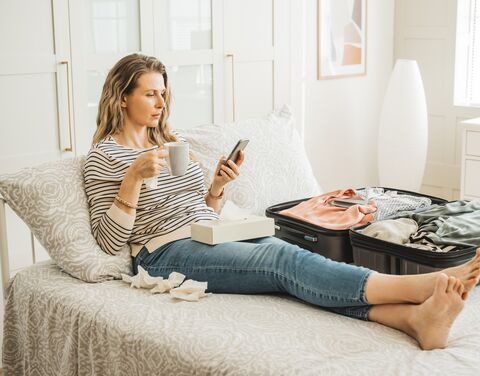
Nausea, diarrhea, runny nose: Poor health can ruin the best trip. Find out how to protect yourself against travel illnesses and enjoy your vacation carefree.
After a long time of anticipation, great frustration – nothing is as annoying as getting sick during your vacation or on a trip around the world. But when you travel, you expose yourself to special risks. That’s why it’s even more likely to get sick on the move than at home. It is usually not an infectious or tropical disease, but one of these harmless but annoying ailments: Indigestion, motion sickness, or a simple cold. Even if they cannot always be avoided, prevention is possible in many cases.
Just left and already miserable? Motion sickness can affect susceptible people in practically any means of transportation: On ships (sea sickness), by car, bus, or tilting train (land sickness) or plane. Kinetosis often manifests itself as chills, pallor, and cold sweat. Later, dizziness, headache, nausea, and vomiting may occur. Children are often particularly affected. Plastic bags, wipes, and disinfectants should always be at hand.
Diarrhea is a typical travel illness and is very common during stays abroad. Sensitive stomachs can even get upset simply from the excitement of the journey. Next, unfamiliar foods as well as bacteria affect the digestive tract. What locals can easily consume, many of us can’t tolerate: We react with discomfort, abdominal pain, and diarrhea. Usually such stomach upsets are mild. In more severe cases, increased fluid loss (dehydration) can be dangerous, especially in babies and toddlers. If in doubt, you should consult a doctor or hospital.
Particularly aggressive germs can even trigger food poisoning with severe abdominal cramps and diarrhea, nausea and vomiting. These symptoms should disappear on their own within two to three days. However, it may take a little longer for you to feel healthy and strong again.
Barely on vacation and already have a cold – this is unfortunately not uncommon. The reasons for this are manifold:
Careful travel planning also includes clarifying travel medical questions: What diseases are more prevalent at your destination? Who is particularly at risk? How can you prevent infection? Who is recommended to get vaccinated? Please note: Deal with the subject of vaccinations at an early stage. Sometimes several doses are needed. And after that, it may take a while for full immunization to build up. For more information, consult HealthyTravel, the website of the Swiss Committee of Experts on Travel Medicine. There you will also find a directory of experts who can advise you professionally in advance of your trip.
By the way, all major tropical diseases are spread by mosquitoes, food/drinking water, or bodily fluids.
These are the most common infectious diseases spread by mosquito bites:
Effective mosquito protection consists of these three measures:
Contaminated water or food may in particular transmit Hepatitis A or Typhoid. A vaccination against both diseases is available in Switzerland. Nevertheless, take care to ensure careful food hygiene in risk areas:
For example, the bodily fluids of infected people or animals can transmit these diseases:
Avoid contact with the bodily fluids of other people and wildlife to prevent infection. Before staying in risk areas, it is advisable to get the respective vaccination. Vaccines against hepatitis B and rabies are available in Switzerland. Vaccinations against Ebola are currently only available in a few African countries.